Not Without Hope (14 page)
Authors: Nick Schuyler and Jeré Longman

The four men positioned themselves in this way from roughly 6 p.m. Saturday to 4 a.m. Sunday. From left to right: Corey in the water. Will standing on the swim platform wearing the seat cushion. Nick with his left leg on the swim platform, and right leg on the boat with Marquis clinging to it. Marquis on top, lying on the cooler while holding Nick’s right leg.
Illustration by John Aymong
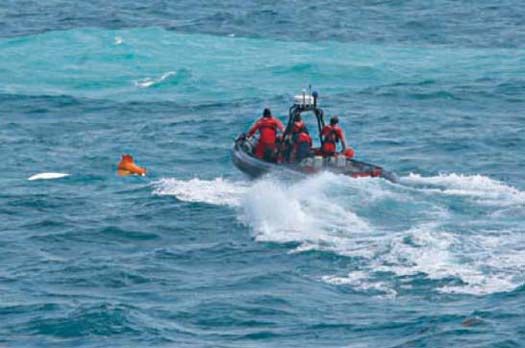
A rescue boat from the Coast Guard cutter
Tornado
speeds out to Nick Schuyler.
Photograph by FN Adam C. Campbell, Courtesy of the United States Coast Guard
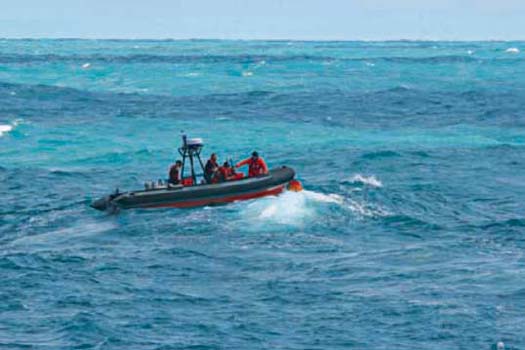
The rescue boat tries to pluck Nick off the overturned hull, but has to back off.
Photograph by FN Adam C. Campbell, Courtesy of the United States Coast Guard
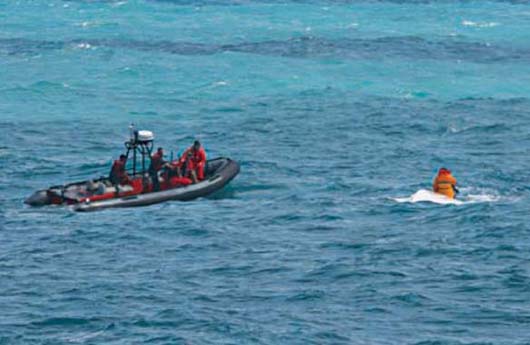
The rescue boat makes another approach as Nick prepares to jump into the water.
Photograph by FN Adam C. Campbell, Courtesy of the United States Coast Guard
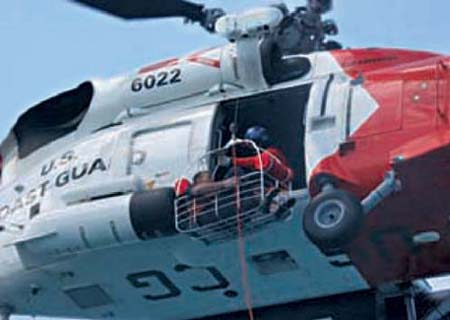
Nick Schuyler gives the thumbs-up upon being hoisted from the
Tornado
to a Coast Guard helicopter.
Photograph by FN Adam C. Campbell, Courtesy of the United States Coast Guard
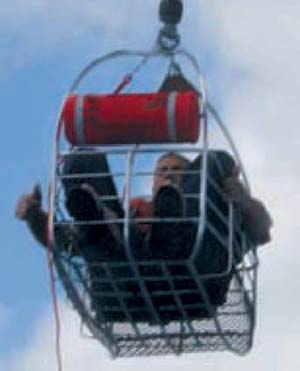
Nick Schuyler is lifted into a Coast Guard rescue helicopter to be taken to Tampa General Hospital.
Photograph by FN Adam C. Campbell, Courtesy of the United States Coast Guard
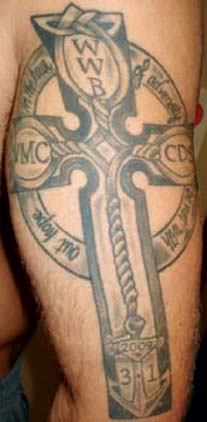
The tattoo of a Celtic cross bearing the initials of his deceased friends that Nick got in their honor.
Courtesy of the author
Late Sunday afternoon, Marcia and Kristen Schuyler arrived at the home of Nick, and Paula Oliveira, in Tampa. Paula’s mother had also arrived from Fort Lauderdale. The Coast Guard had released the names of the missing boaters. The rest of the afternoon and evening became a blur of phone calls, worrying, and flipping from one news report to the next.
Paula’s mother made tea. Paula ate two crackers but could get nothing else down. She felt sick to her stomach. She did not want to upset Nick’s mother, so when she felt herself begin to cry, she pretended to receive or make a phone call and walked into her bedroom. Once she took the dogs outside and was struck by how chilly it was. How could they survive this cold on the water? she wondered.
Several times, Paula talked to Rebekah Cooper, Marquis’s wife. Rebekah seemed so strong. “They’re big guys,” she told Paula. “They’re so strong. They’re in such great shape.”
Paula tried to convince herself that they had just run
out of gas. She joked with Kristen, “Nick’s going to make it out like they were on
Survivor
and had a little adventure. Here we are, worried sick and hysterical, and he’ll come home and make a joke.”
Kristen sent out a mass text message to her friends, letting them know that her brother was one of the missing boaters, asking them to say a prayer. She went outside several times to get some fresh air. It had never felt so cold in Florida.
Neither Kristen nor Marcia could sleep. Marcia dozed off a few times in the living room, but then she would awaken and kick the covers off of herself. “I can’t be covered and warm and sleeping,” she told her daughter, “because my son is out there somewhere, probably freezing.” Friends came by with food, but Marcia thought, I can’t eat and drink, because he’s out there with no food or drink.
She sat in the living room and clenched her fists and repeatedly said, “Come on, Nick, you can do it!” Sometimes she felt guilty because she wasn’t saying the names of the other three guys.
At 9:59, Marcia sent Nick a text message: “I luv u so much no u will b safe please stay strong u make me so proud of u!” This was Sunday, March 1. The message would not be delivered until March 5. Marcia kept the message in her phone for the next eight months.
She and Kristen kept calling the Coast Guard, seeking updates. “I’m sorry I’m such a pain, but that’s my son out there,” Marcia said at one point. The person who answered the phone was gracious each time. At one point, though, Marcia grew impatient when she was told that a cutter had to be pulled back because of twelve-to fourteen-foot seas.
“That boat can’t get out there but my son is still out there in those waves?” she said. “You’ve got to keep a boat out there.”
As scared as Kristen was, it never crossed her mind that Nick wouldn’t make it home safe. It didn’t seem like an option. She never imagined that the boat had turned over. She pictured four guys standing in the boat, getting wet, frustrated that something had gone wrong, but out of harm’s way.
She told her mother, “They’re probably in the boat, their clothes hanging over the side, drying out, and they’re calling each other dumb asses for letting this happen.”
Nick had always been a top athlete, Kristen told herself. As a kid, he practically killed himself to be an all-star. At the same time, he was a team player. Making the football team as a walk-on at USF seemed like the biggest challenge of his life.
Kristen had come to visit him in October 2005, when Nick was thinking about returning to school and trying out for the team. He had left Kent State, moved to Florida, and was painting and hanging drywall with his father. He had not played football in five years, but he painted lines on the road to mark off his forty-yard dash and jumped fences at night and ran stadium steps. When he set his mind to something, he always did it, Kristen told herself.
When Kristen had been finishing her undergraduate work at Kent State, Nick had been her personal trainer for a while. He was very intense. He made her run sprints, and if she was off her goal by a hundredth of a second, he would take her water bottle and not let her drink until she ran the designated time.
He would never settle for not completing a task, Kristen thought to herself.
Stu Schuyler went home to Tarpon Springs and glued himself to the television. He called the Coast Guard regularly. He also talked to an old high school friend from Ohio who had served with the Navy SEALs in Vietnam. “Don’t give up hope,” the friend told him. “If Nick was able to stay with the boat, if he had extra clothes that Kristen said he had taken, if he could pull himself out of the water, he could live two or three days.”
Later, Stu turned the television on in his bedroom, grabbed a picture of Nick and held it to his chest. He would doze off and wake up, hearing the wind rattling the screened-in patio. He would cry and say, “God, please help us!”
H
alfway through the night, I knew I was dying. I got to a point where I wasn’t hungry anymore. I would feel like I was starving and then I wouldn’t feel hungry at all. I was so numb, my feet were so numb and painful at the same time. The pain had come back in my feet like on the first night. A sharp pain, especially in my big toes, a constant pressure. It felt like a consistent, real bad stubbing of your toe, like you ran into the couch. I felt like my feet had lost circulation, even though the water felt warm. I could barely move my ankles. My shins were shot, like a layer of skin was scraped away and then a layer under that. There was nothing there. I tried to wiggle my legs and my feet, but they weren’t moving. I had tried to hold on for so many hours with my feet and now they were done.
I was aware, but I felt weak. My skin felt wet and soft like I could cut a slice or just pinch it off. I looked at my legs. They were thin. I had lost definition, a lot of muscle. I felt my stomach. I could feel all my ribs. It felt like one of those old-time washboards. I felt my abs, little mounds, absolutely no fat, just skin and muscle on my stomach. It felt like my body fat had dropped from 9 or 10 percent
to next to nothing. My job—my life—was to be fit, but I felt like my body was eating away at itself. It was looking for some way to burn fat, but there was no more fat. Now it was eating muscle. I was experiencing things I had never felt before. I thought, This is what dying feels like.
I had used the expressions so many times in my life—“I’m dead tired” or “I’m dead” or “you’re killing me”—from a strenuous workout, but that was a cakewalk compared to this. I was dying. I felt almost like a corpse. My heart was still pumping, but I’m not sure how. I rubbed and hit my chest and shoulders and biceps to try to create some warmth, but I didn’t want to use what little energy I had left.
My stomach felt like it was being flipped every single way. I felt nauseous. From time to time I got real dizzy. I kept trying to concentrate on what I was thinking about and saying to myself, Oh my God, I’m dying—please, God, help me, I don’t have much time left.
I was freezing and I kept putting my hands in the water to warm them. I prayed. “Please, God, find me. If I don’t make it out, protect my mom and my sister and my dad and Paula and my dogs.”
Thank God I had Will bring my winter jacket. Otherwise, I wouldn’t be alive right now. It was water-resistant and somewhat insulated. I kept going back and forth about the land. Or what I thought was land. It seemed like I was getting a lot closer and then it seemed like I drifted past it. I was to the left of it then to the right of it. It was in front of me, then behind me. I knew I was sticking with the boat.
I
NOTICED SOMETHING
in the water at the stern, a foul smell that lasted for about an hour. I didn’t know whether it was some kind of fish. It almost smelled like the bait we had used. It almost looked
like some kind of animal’s waste, like some kind of animal went to the bathroom, like a squid. I couldn’t see any animal, but the sky was bright and it looked like there was a cloud against my feet. It almost looked like chum, broken-down fish. It looked half-eaten, half-digested. It smelled. It was thick, a milky, yolky texture. I never saw anything, not fins or tentacles, but I thought to myself, The squid’s back; no way in hell I’m going in the water. It was right there, whatever it was. I tried to lift my feet out of the water, it was so gross.
B
Y MIDNIGHT
S
UNDAY
, I had been alone for almost six hours. I was awake and not awake, barely able to keep my head up. I was slouched, hunchbacked. I tried to crack my back, but it didn’t give me any relief. I was completely out of whack. My butt was causing me a lot of pain, forcing me to sit in such an uncomfortable position that I could never relax. I kept hugging the motor, my feet under a trim tab or the swim platform, constantly fighting to stay on the boat.
Every time I ended up in the water, it was an immediate shock. I jumped back onto the hull as quick as I could. It didn’t feel that bad, but there was no hanging in the water, as warm as it was. I had seen that cloud in the water and smelled that awful smell. So I sat on the hull and tried to stay as dry as possible.